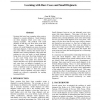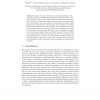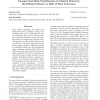7 search results - page 1 / 2 » Learning with Rare Cases and Small Disjuncts |
ICML
1995
IEEE
13 years 8 months ago
1995
IEEE
Systems that learn from examples often create a disjunctive concept definition. Small disjuncts are those disjuncts which cover only a few training examples. The problem with sma...
SBIA
2004
Springer
13 years 10 months ago
2004
Springer
One of the main objectives of a Machine Learning – ML – system is to induce a classifier that minimizes classification errors. Two relevant topics in ML are the understanding...
ICML
2010
IEEE
2010
IEEE
Unsupervised Risk Stratification in Clinical Datasets: Identifying Patients at Risk of Rare Outcomes
13 years 6 months ago
Most existing algorithms for clinical risk stratification rely on labeled training data. Collecting this data is challenging for clinical conditions where only a small percentage ...
ILP
2003
Springer
13 years 10 months ago
2003
Springer
In the case of concept learning from positive and negative examples, it is rarely possible to find a unique discriminating conjunctive rule; in most cases, a disjunctive descripti...
MM
2005
ACM
13 years 10 months ago
2005
ACM
In this paper we unify two supposedly distinct tasks in multimedia retrieval. One task involves answering queries with a few examples. The other involves learning models for seman...



